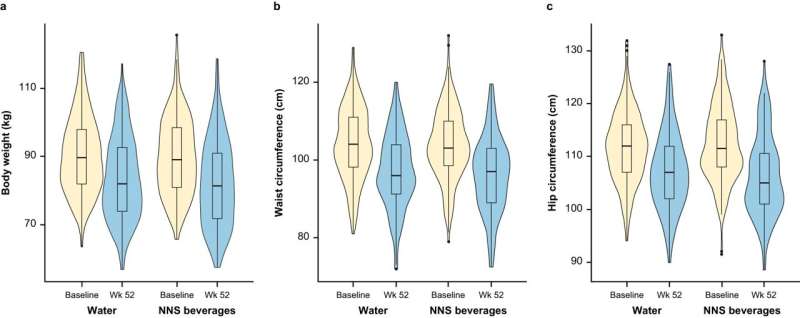This article has been reviewed according to Science X's editorial process and policies. Editors have highlighted the following attributes while ensuring the content's credibility:
fact-checked
peer-reviewed publication
trusted source
proofread
Researchers investigate the relative merits and hazards of sweetened drinks vs. water

Psychology researchers from the University of Liverpool have conducted a long-term study to understand the effect of artificially sweetened drinks on weight management.
The paper, published in the International Journal of Obesity and presented by Professor Jason Halford during Obesity Week in Texas, U.S., concludes that drinking non-nutritive sweetened (NNS) beverages does not undermine weight control when compared to water.
Professor Jo Harrold, Dean of Psychology at the University of Liverpool and Professor Jason Halford, Professor, Biological Psychology & Health Behaviours at the University of Leeds and former head of Psychological Sciences at the University of Liverpool conducted the research.
Professor Jo Harrold said, "Our study captures the key long-term effects of sweetener use on behavior, appetite expression, and food preferences as well as weight and other health outcomes. The results reinforce previous study outcomes and that, in comparison to water, drinking non-nutritive sweetened (NNS) beverages does not undermine weight control when compared to water."
"The University of Liverpool is one of the UK's leading research-intensive higher education institutions, with a key focus on public health. We believe in examining potential approaches to weight management among individuals who are overweight and obese and this latest paper forms part of a range of studies we've conducted into this area."
The effectS of non-nutritive sWeetened beverages on appetITe during aCtive weigHt loss (SWITCH) trial was conceived and designed in the context of the need to reduce sugar in the diet and to address questions about the potential effects on appetite regulation of using sweeteners as a substitute.
SWITCH follows on from and is part of a broader set of interventions to examine this question and includes a set of measures to capture key long-term effects of sweetener use on behavior, appetite expression, and food preferences as well as weight and other health outcomes.
The SWITCH trial expands upon the findings of a previous trial by JC Peters and colleagues, published in Obesity (Silver Spring), which indicated that non-nutritive sweetened (NNS) beverages promote weight loss and weight maintenance in the context of a weight management program when compared to water. In particular, SWITCH addresses the methodological weaknesses and knowledge gaps that are associated with this previous trial by:
- Using past experience of NNS beverages to randomize participants to the different treatment arms in order to control for previous consumption habits.
- Examine whether changes in outcomes are maintained over time (i.e. for a further 52 weeks after the end of the 40-week maintenance period).
- Address the mechanisms through which NNS beverages may affect appetite and body weight. Some previous research has suggested that chronic NNS consumption could weaken the association between sweetness and energy, thereby impairing physiological control of appetite and increasing preference for sweet-tasting foods. In order to address these key mechanistic questions, the SWITCH trial explores the biological and behavioral effects of NNS beverages on appetite.
- Determining whether the effects of NNS on weight loss, maintenance, behavior, and physiology are moderated by individual differences.
Taken together, the SWITCH trial provides insight into biological and behavioral effects of NNS beverages on appetite, and the longer term effects on body weight in the context of a randomized-controlled trial.
More information: Joanne A. Harrold et al, Non-nutritive sweetened beverages versus water after a 52-week weight management programme: a randomised controlled trial, International Journal of Obesity (2023). DOI: 10.1038/s41366-023-01393-3





















